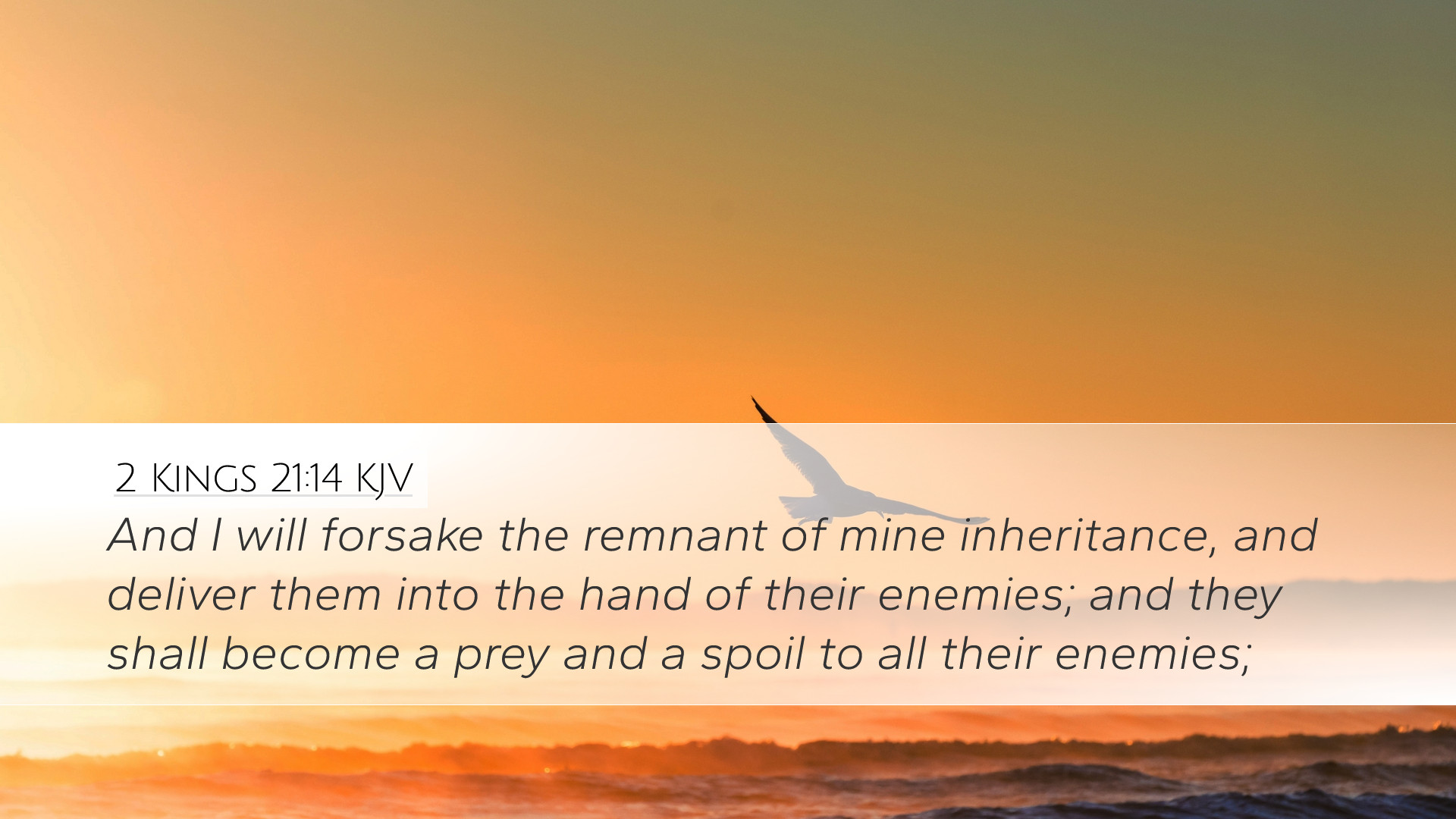Commentary on 2 Kings 21:14
Bible Verse: "And I will forsake the remnant of mine inheritance, and deliver them into the hand of their enemies; and they shall become a prey and a spoil to all their enemies;" (2 Kings 21:14, KJV)
Context and Background
The passage of 2 Kings 21:14 occurs during a tumultuous period in the history of Israel and Judah. It reflects the consequences of the actions of King Manasseh, whose reign was characterized by idolatry, immoral practices, and a blatant disregard for the covenant established by God.
During his rule, Manasseh led the people into sin, reversing many of the reforms instituted by his father, Hezekiah. This verse captures the gravity of divine judgment: God's willingness to forsake His inheritance (Israel) due to their unfaithfulness.
Theological Themes
- Divine Judgement: This verse illustrates the principle that continued disobedience leads to judgment. God's patience has limits, and He may decide to allow His people to face the consequences of their actions.
- God’s Sovereignty: The deliverance of God's people into the hands of their enemies highlights His absolute control over nations and history. Ultimately, no one can oppose God's will.
- Forsaking the Remnant: The mention of the 'remnant' indicates that while judgment is upon the nation, God still has a faithful community within His people. This foreshadows themes of hope and restoration.
Insights from Matthew Henry
Matthew Henry emphasizes the severity of the judgment pronounced in this verse. He notes that the forsaking of God's inheritance is not an arbitrary act but a response to the people’s persistent sin and idolatry. Henry points out that God’s judgments are often a result of a nation's moral decline and a direct consequence of ignoring God’s commands.
Henry also reflects on the heartbreaking reality that God’s people can lose His protection when they turn away from Him. He highlights that it is a warning intended for contemporary believers to guard against spiritual complacency.
Insights from Albert Barnes
Albert Barnes elaborates on the phrase “I will forsake the remnant of mine inheritance.” He explains that this act of forsaking signifies a deliberate withdrawal of divine favor and protection. Barnes interprets this as a direct result of the people’s rebellion against the covenant relationship God established with them.
Furthermore, Barnes points out that the remnant signifies that while judgment may come, God preserves a small group of faithful individuals. This remnant serves as a reassurance that God always maintains a people for Himself, even amid widespread apostasy.
Insights from Adam Clarke
Adam Clarke provides a detailed commentary on the context surrounding Manasseh’s reign. He argues that entries into idolatry and rampant sin were met with fierce judgments from God. Clarke connects the judgment of being delivered into enemies’ hands as a multifaceted consequence of spiritual and moral failure.
Clarke also emphasizes the profound sadness of God’s forsaking His own people, indicating the depth of the relationship that is severed due to disobedience. He underscores the idea that judgment is never taken lightly in Scripture; it is always a last resort and comes after extensive warnings from God.
Application for Today
For pastors, students, and theologians, 2 Kings 21:14 serves as a profound reminder of the serious nature of God’s covenant with His people. The passage challenges believers to reflect on their fidelity to God and to examine how cultural and moral influences might lead them away from obedience.
Moreover, the assurances given concerning the remnant inspire hope and call for faithful perseverance amidst trials and spiritual decline in society. In this light, the commentary invites the Church to prayerfully assess its own standing with God and pursue a life that honors the covenant relationship established through Christ.
Conclusion
2 Kings 21:14 encapsulates a pivotal moment in the biblical narrative where the consequences of disobedience manifest in divine judgment. Through the insights of Henry, Barnes, and Clarke, we gain a deeper understanding of the severity of sin, the nature of God’s judgment, and the enduring hope found in the remnant.
This passage ultimately beckons contemporary believers to remain steadfast in their commitment to God, recognizing that while sin may bring judgment, God's grace and faithfulness endure for those who remain true to Him.


